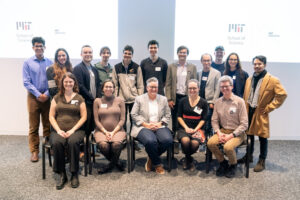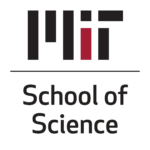
Photo by Bryce Vickmark.
The MIT School of Science and the MIT Libraries present the MIT Prize for Open Data to highlight the value of open data at MIT and to encourage the next generation of researchers. The following winners and honorable mentions were selected from more than 80 nominees representing all five schools, the college, and several research centers across MIT.
2023 MIT Prize for Open Data winners and honorable mention recipients were honored at the Open Data @ MIT event held Oct. 24 at Hayden Library. Read more at MIT News
Winners
- Hammaad Adam, graduate student, Institute for Data, Systems, and Society (IDSS); Vinith M. Suriyakumar; graduate student, Electrical Engineering and Computer Science (EECS); Tom Pollard, research scientist, Institute for Medical Engineering and Science (IMES); Benjamin Moody, programmer analyst, IMES; Jennifer Erickson, senior fellow, Federation of American Scientists; Greg Segal; Brad Adams, Southwest Transplant Alliance; Diane Brockmeier, Mid-America Transplant; Kevin Lee, Mid-America Transplant; Ginny McBride, OurLegacy Organ and Tissue Donation Services; Kelly Ranum, LOPA; Matthew Wadsworth, Life Connection of Ohio; Janice Whaley, Donor Network West; Ashia Wilson, assistant professor, EECS; and Marzyeh Ghassemi, assistant professor, EECS and IMES
Organ Retrieval and Collection of Health Information for Donation (ORCHID) is the first ever multi-center dataset dedicated to the organ procurement process. ORCHID provides researchers the first opportunity to quantitatively analyze organ procurement organization decisions and identify operational inefficiencies. - Adam Atanas, postdoctoral associate, Brain and Cognitive Sciences; and Jungsoo Kim, graduate student, Brain and Cognitive Sciences
WormWideWeb.org allows researchers to easily browse and download one-of-a-kind datasets collecting brain-wide neural recordings of defined cells across an animal’s brain, simultaneous to behavior quantification. - Paul Berube, research scientist, Civil and Environmental Engineering; Steven Biller, Assistant Professor of Biological Sciences, Wellesley College
Unlocking Marine Microbiomes with Open Data: Open data of genomes and metagenomes for marine ecosystems, with a focus on cyanobacteria, leverage the power of contemporaneous data from GEOTRACES and other long-standing ocean time-series programs to provide underlying information to answer questions about marine ecosystem function. - Jack Cavanagh, research manager, J-PAL Global, Abdul Latif Jameel Poverty Action Lab (J-PAL); Sarah Kopper, interim director of research, J-PAL Africa; and Diana Horvath, research and training associate, J-PAL Global
J-PAL’s Data Publication Infrastructure includes a trusted repository containing over 130 open-access datasets from randomized controlled trials in development economics; a dedicated team of data curators to help research affiliates publish open data and replication packages; and public good coding tools and a suite of guides and training materials to help other teams publish data in an efficient and ethical manner. - Jerome Patrick Cruz, graduate student, Political Science; Philip Arnold P. Tuaño dean, Ateneo School of Government, Ateneo de Manila University; Heidi Mendoza professor of practice, Ateneo School of Government, Ateneo de Manila University;
and Rainier Gerald Mora, graduate student, Ateneo de Manila University
OpenAudit leverages advances in natural language processing and machine learning to make data in public audit reports more usable for academics, policy researchers, as well as governance practitioners, watchdogs, and reformers. - Daniel Kurlander, undergraduate student, Earth, Atmospheric, and Planetary Sciences
An Interactive System for Rapidly Filtering and Displaying Images from the Rosetta Comet Mission: This tool allows users to rapidly access and filter images of the comet 67P/Churyumov-Gerasimenko and is critical for planetary scientists to easily access and utilize the images in their research. - Halie Olson, postdoctoral associate, Brain and Cognitive Sciences
A functional magnetic resonance imaging (fMRI) study on language processing in a sample of 20 adults. The study used video clips from Sesame Street in which researchers manipulated the comprehensibility of the speech stream, allowing them to isolate a “language response” in the brain. - Thomas González Roberts, graduate student, Aeronautics and Astronautics
International Telecommunication Union Compliance Assessment Monitor combats the heritage of secrecy in outer space operations by creating human- and machine-readable datasets that succinctly describe the international agreements that govern satellite operations. - Melissa Kline Struhl, research scientist, Brain and Cognitive Sciences
A free, open-source platform for remote studies with babies and children, Children Helping Science makes it possible for researchers at over 100 institutions to conduct reproducible studies. The platform includes an open review process and, in addition to the code itself, provides open resources that enable data sharing, while maintaining a secure data environment for sensitive research data. - JS Tan, graduate student, Urban Studies and Planning; Nataliya Nedzhvetskaya, graduate student, Sociology Department, UC Berkeley
Collective Action in Tech Archive is an open database of all publicly recorded collective actions taken by workers in the global tech industry.
Honorable Mentions
- Alex Berke, Dan Calacci, Robert Mahari, Sandy Pentland, Kent Larson
First large open dataset of crowdsourced consumer purchase histories - Jordana Bloom
Effects of reproductive aging on gene expression in tissues within and outside of the reproductive tract - Yun Chang, Yulun Tian, Long Quang, Arthur Schang, Carlos Nieto-Granda, Jonathan How, Luca Carlone
Kimera-Multi Dataset - Wenhao Gao
Therapeutic Data Commons (TDC) - Kailin Graham, Christopher R. Knittel
U.S. Employment Carbon Footprints - Hannah Jacobs
Naturally varying splicing in human cohorts is widespread and can be used to interpret human disease
- Hause Lin, Jana Lasser, Stephan Lewandowsky, Rocky Cole, Andrew Gully, David Rand, Gordon Pennycook
An open-source wisdom-of-expert-crowds dataset for evaluating misinformation consumption and engagement - Yi Liu
MECP2 NeuroAtlas - Cole Ruehle, Rodrigo Garza Garcia, Nicholas Liu
Who Are America’s Lobbyists: A comprehensive dataset of histories, donations and influence - Leonard Schrage, Zoe Le Hong
Urban Ingredients - César Terrer
When things get MESI: The Manipulation Experiments Synthesis Initiative—A coordinated effort to synthesize climate change experiments - Dylan Walsh
Standardization of chemical representations
Co-sponsored by


2023 Committee
Committee Co-Chairs
- Chris Bourg, Director, MIT Libraries
- Rebecca Saxe, Associate Dean of Science, School of Science (SoS)
Committee Members
- Advait Athreya, graduate student, Computational & Systems Biology
- Iain Cheeseman, Herman and Margaret Sokol Professor of Biology, SoS and Whitehead
- Fotini Christia, Ford International Professor in the Social Sciences, School of Humanities, Arts, and Social Sciences and Institute for Data, Systems, and Society
- Satrajit Ghosh, McGovern Institute, SoS, and Director of Data Models and Integration, ReproNim
- William H. Green, Hoyt Hottel Professor in Chemical Engineering
- Ye Li, Chemistry, Chemical Engineering, and Materials Science and Engineering Librarian, MIT Libraries
- Nick Lindsay, Director of Journals and Open Access, MIT Press
- Jack Payette, graduate student, Earth and Planetary Sciences, SoS
- Tom Pollard, research scientist, Laboratory for Computational Physiology
- Dave Rand, Erwin H. Schell Professor and Professor of Management Science and Brain and Cognitive Sciences, Sloan School of Management
- Justin Reich, associate professor of Comparative Media Studies/Writing, director of the MIT Teaching Systems Lab
- Pedro Reynolds-Cuéllar, graduate student, MIT Media Lab/ACT
- Heather Sardis, Associate Director for Technology, MIT Libraries
- Virginia Spanoudaki, Scientific Director, Preclinical Imaging and Testing Facility, Koch Institute for Integrative Cancer Research
- Djuna von Maydell, graduate student, Department of Brain and Cognitive Sciences
